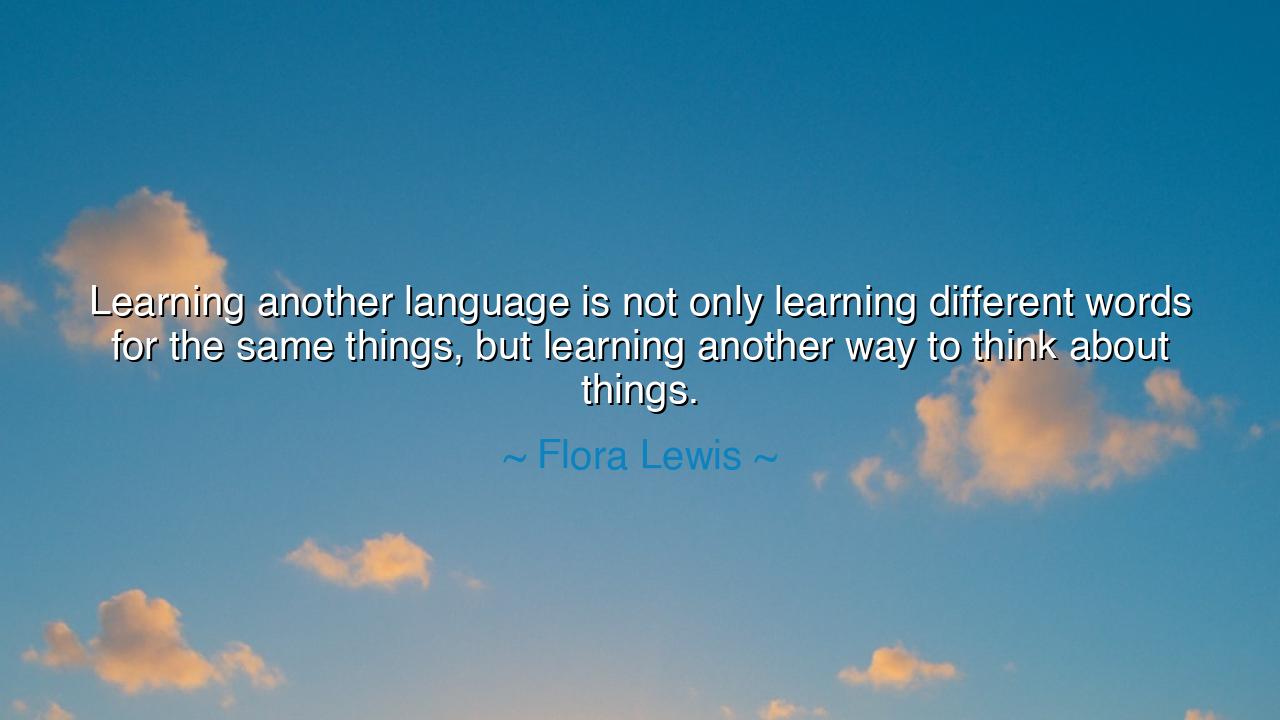
Learning another language is not only learning different words
Learning another language is not only learning different words for the same things, but learning another way to think about things.






“Learning another language is not only learning different words for the same things, but learning another way to think about things.” — thus spoke Flora Lewis, a journalist and thinker whose words reveal a truth as vast as the human mind itself. In this profound saying, she reminds us that language is more than sound, more than grammar, more than vocabulary — it is the architecture of thought, the vessel of a people’s soul. To learn another language, she says, is not merely to translate words, but to open one’s heart and mind to a new way of seeing the world.
Flora Lewis, a celebrated writer of the twentieth century, spent her life observing nations, cultures, and the intricate threads that bind them together. Her wisdom arose from experience — from witnessing how language shapes identity, how it builds bridges between strangers and reveals the deep patterns of human thought. Her words echo the belief of philosophers and poets before her: that language is not only how we communicate, but how we perceive, how we feel, how we dream. To change one’s language is to change one’s world.
In her saying, Lewis uncovers the secret truth that each language is a different lens upon reality. Every tongue carries the spirit of its people — their history, their humor, their pain, and their philosophy. When one learns another language, one learns not just to name the world differently, but to understand it differently. The French may say je ne sais quoi to capture a subtle mystery that English cannot express. The Japanese may speak of komorebi, the sunlight filtering through leaves — a single word for a beauty other tongues require entire sentences to convey. The Hawaiians have aloha, meaning not just “hello,” but love, peace, and connection — the essence of harmony. These words are not mere sounds; they are windows into the soul of humanity.
The ancient philosophers, too, knew the power of language to shape the mind. The Greek thinker Heraclitus declared, “The limits of my language mean the limits of my world.” And in later ages, the scholar Wilhelm von Humboldt taught that language is not a prison, but a form of energy that molds thought itself. To learn a new tongue, then, is to enlarge the boundaries of your consciousness. It is to see from another’s eyes, to feel through another’s heart, to dwell for a time in another’s soul. Thus, the one who speaks two languages has not two voices, but two visions of the same sun.
Consider the story of Nelson Mandela, who, though born into one language and culture, learned the tongues of his captors and opponents. He once said, “If you talk to a man in a language he understands, that goes to his head. If you talk to him in his language, that goes to his heart.” In mastering their language, Mandela did not simply learn their words; he learned their world. Through language, he built understanding — and through understanding, he built peace. His life became living proof of Flora Lewis’s truth: that to learn another language is to cross the bridge between minds.
Yet this teaching carries an even deeper meaning: that language does not only connect us to others — it transforms us within. When we learn a new language, we begin to think differently, to question differently, even to feel differently. We discover parts of ourselves that we did not know existed. We begin to understand that our way of naming things is not the only way, that truth wears many garments. In this humility, wisdom is born. The mind that knows only one language lives in one world; the mind that learns many walks among many worlds and becomes a citizen of them all.
Therefore, my children, seek not only to speak, but to listen — not only to learn words, but to learn worlds. When you study another language, do not rush to mastery of grammar alone; seek instead to grasp the spirit behind the words. Read their stories, learn their songs, feel their laughter and grief. For in doing so, you will come to understand more deeply what it means to be human. You will learn patience, empathy, and perspective — gifts far greater than fluency.
For Flora Lewis’s wisdom is timeless: “Learning another language is not only learning different words for the same things, but learning another way to think about things.” To learn another language is to add another light to the lamp of the mind. It is to awaken to the many faces of truth. So keep learning, not to speak merely, but to understand — for every new tongue you learn will make your heart larger, your spirit stronger, and your vision of the world infinitely more beautiful.






AAdministratorAdministrator
Welcome, honored guests. Please leave a comment, we will respond soon